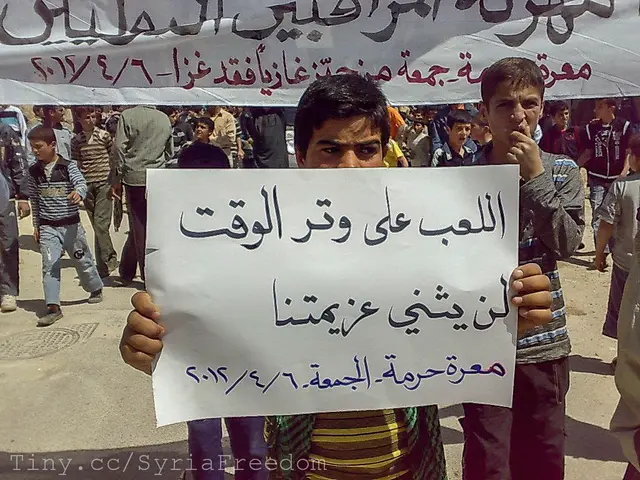Women's Struggles in Taliban-Controlled Afghanistan and the US Policy Dilemma
In the heart of Kabul, Afghan women continue to assert their fundamental human rights, undeterred by the surging violence that engulfs the city. Their resilience is a testament to their unwavering determination, as they navigate the complex and precarious political landscape.
The United States, in a significant acknowledgement, has implied the de facto authority of the Taliban government, signalling a potential shift in its approach. Joel Blaxland, an assistant professor of political science, poses a thought-provoking question: will the United States seek to influence the Taliban regime to protect women's rights, and at what cost?
The journey of women's rights in Afghanistan is a rich tapestry, woven with threads of progress and setbacks. By the mid-20th century, females, primarily from the urban elite, were being educated en masse at Kabul University and abroad in countries like Turkey. By the 1970s, women were making strides in various sectors, with roughly half of university students being women.
The 2004 Afghan constitution mandated that 27% of seats in the Wolesi Jirga (lower house) and 17% in the Meshrano Jirga (upper house) be reserved for women. This was a significant step towards gender inclusiveness in Afghan politics. The 2018 parliamentary election saw unprecedented numbers of female representatives in the Afghan National Assembly.
However, the Taliban's rise to power threatens to erase decades of progress. The Taliban is reportedly assassinating women's rights advocates and politicians, murdering schoolgirls, and appears determined to wipe out electoral processes and women's rights, wholesale.
The hasty withdrawal of US forces in August has left the United States grappling with a critical challenge: how to handle a Taliban government in power. The United States must make a decision about how to move forward: either seek to influence the Taliban regime to protect women's rights and accept the attendant risks of appearing to recognize the regime's legitimacy, or refuse to do so and face the risk of watching women's hard-earned advancements evaporate.
A blanket rejection by the United States presumably limits any influence the US may have on the matter concerning women's rights under the Taliban. The National Resistance Front, however, has declared the Taliban regime illegitimate and has aspirations for its own parallel government.
The origins of the gender-inclusive political measures in Afghanistan are tied to the 2001 US-led military invasion. After the Taliban was routed, a team of Afghans and foreign legal experts set out to draft a new constitution. This new constitution, signed a few months later, helped lay the groundwork for the legal equality of men and women and a more gender-inclusive political regime and society.
The idea to introduce gender-equitable political measures in Afghanistan during the US military operation in 2001 was aligned with international efforts rooted in the UN Security Council Resolution 1325, which was adopted in 2000 to increase women's inclusion in peace and security processes. However, no specific individual or group is named in the sources as the initial proponent of this idea during the US intervention.
Notable figures like Queen Soraya Tarzi (1926-29), Malalai Joya, and Belquis Ahmadi have played pivotal roles in advocating for women's rights in Afghanistan. Queen Soraya Tarzi encouraged and promoted female education and advocated for women's employment rights. Malalai Joya, a female political delegate involved in the 2003 constitutional loya jirga, protested provisions she argued would politically empower warlords. Belquis Ahmadi described the share of women that turned out to vote in the 2018 parliamentary election as 'one of the few bright spots' in an otherwise challenging electoral process.
The United States Secretary of State, Antony Blinken, has made comments that suggest the United States will favor seeking to influence the Taliban regime. The path forward is uncertain, but one thing is clear: the struggle for women's rights in Afghanistan continues, and the international community must stand with Afghan women as they fight for their fundamental human rights.
Read also:
- Competing strategies for addressing infertility come under scrutiny in the halls of Congress
- Escalated levels of antibiotic-resistant bacterial infections detected in Gaza, according to an analytical study.
- Trump's intensified measures in Washington D.C. could result in the imprisonment of numerous homeless individuals, causing concerns among advocates.
- Discussion now center on immediate release of all hostages within Gaza ceasefire negotiations, as per Netanyahu's suggestions.








